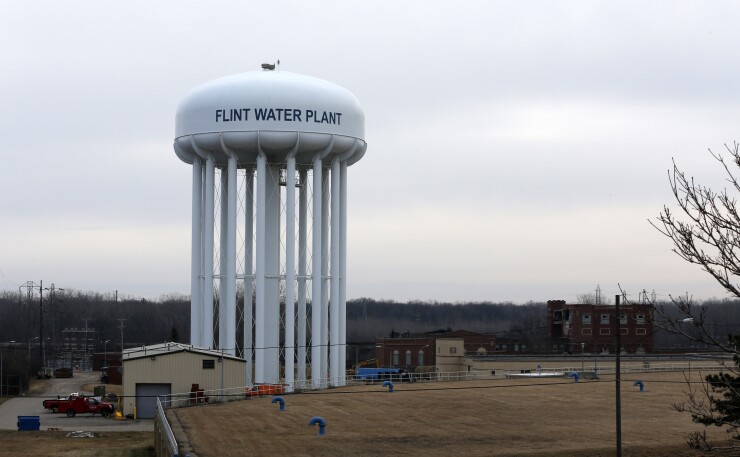DALLAS -- Flint, Michigan’s city council voted Tuesday to extend its current short-term contract with Great Lakes Water Authority for two years.
The council acted under a court-ordered deadline to make a decision on a long-term water contract. On Monday the city council gained an extra 24 hours to decide on a 30-year contract with GLWA, where the city currently draws it water from, or present an alternative.
The deadline extension came after the council filed an emergency motion to extend the deadline with Detroit U.S. District Judge David Lawso on Sunday night. The city council is under pressure to make a decision on a 30-year contract with GLWA under which it would lose water rights to the Karegnondi Water Authority, which will operate a new bond-financed pipeline supplying Lake Huron water. Flint would remain on the hook for its share of debt for the pipeline but would recoup the costs through the sale of its rights.

On Monday evening the city council voted to extend its current short-term contract with GLWA for two years in a bid to buy time to independently analyze all water options available to the city. The plan was presented by councilman Herbert Winfrey, one of the three council members on the ad hoc committee involved in closed-door mediation with attorneys in the lawsuit between the Michigan Department of Environmental Quality and the Flint city council. Winfrey believes the two-year deal will comply with the judge’s order.
“We’ve been in mediation trying to create a better deal for the city and we want our own expert — because myself and the people of this city have become distrustful of the state — so what we want is to get our own consultant to look at the terms being put forward by the Great Lakes Water Authority and Karegnondi,” he said.
Eight of the nine council members came together to vote on a resolution to extend Flint's contract with GLWA until Oct. 31, 2019. Councilman Eric Mays abstained from voting due to lack of discussion and action, he said.
In June, the MDEQ asked for a mandatory injunction directing the city to sign a 30-year deal with GLWA, from which the city currently draws its water, or present another alternative.
The MDEQ said it had no comment on the alternative plan the council presented on Monday night. It has yet to file its response with the court to the council’s motion for reconsideration filed on Sunday night.
The water debate has divided the Flint city council and the city administration of Mayor Karen Weaver.
Late Monday night the city administration filed its response to the council’s motion for reconsideration. The city said it is prepared to sign a 30-year contract with GLWA and said that the city council has failed to agree on a plan that will satisfy the U.S. Environmental Protection Agency. The response was filed prior to the city council vote on the two-year contract.
The plan Weaver presented in April would sell off its rights to pipeline water and use those funds to cover the portion of KWA debt it is obligated to repay. The city is legally obligated to repay 34% of the $220 million 2014 bond issue. The city’s former emergency managers committed the city to participating in the KWA project with Genesee County.
The city’s bond commitment is estimated at $7 million per year for the next 28 years. When the city’s contract with Detroit's water agency, the GLWA's predecessor, ended, the city started pulling water from the Flint River while awaiting completion of the new pipeline and didn’t treat the water properly, leading to a contamination crisis that fouled the city's water and its pipes. Weaver argues it's too risky to again make a water supply switch.
Flint has made a two-year agreement, and then a series of month-to-month extensions with GLWA that, according to the MDEQ, are not financially sustainable. The contract to stay with GLWA would result in about $9 million in savings, because it would lock in a more favorable rate with GLWA and Flint would recoup about $7 million in annual debt service by transferring its KWA water rights to GLWA.
Lawson's 29-page order filed last week said that the viability of the long-term agreement depends in part on the ability to negotiate issuance of KWA Refunding Bonds, “which require lead time that already has been foreshortened by the delay in signing the negotiated agreement past September 30, 2017.”





